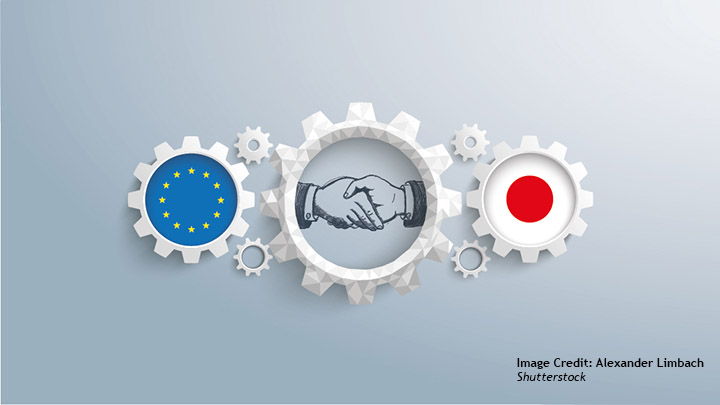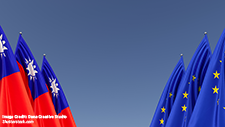Moving Beyond Rhetoric? The EU-Japan Strategic Partnership Agreement (SPA)

Axel Berkofsky
In July 2018, Japan and the EU signed both the Economic Partnership Agreement (EPA) and the Strategic Partnership Agreement (SPA). The two agreements have been described as formally ushering in a new era of increased cooperation and global leadership between the two normative powers. To understand the significance of this cooperation, ISDP asked three authors to debate how effective the two agreements have been thus far and what we can expect from the strengthened partnership particularly during a time when the world is facing a global pandemic and an impending economic recession.
The three authors are; Axel Berkofsky, Senior Lecturer at the University of Pavia, Italy and Senior Associate Research Fellow at the Milan-based Istituto per gli Studi di Politica Internazionale (ISPI); Hiroki Sekine, Visiting Fellow at both Chatham House and ISDP and former Senior Advisor to the corporate planning department at the Japan Bank for International Cooperation (JBIC); And, Lars Vargö, Distinguished Fellow at ISDP and former Swedish Ambassador to Japan and South Korea.
You can read Hiroki Sekine’s paper here – Partners in a Post Covid-19 International Order?
You can read Lars Vargö’s paper here – Close Partners or Hesitant Dreamers?
The following Issue Brief is written by Dr. Axel Berkofsky (pdf version)
Introduction*
Due to the much-perceived loss of U.S. global leadership in international politics and security under the Trump administration, coupled with authoritarian strongmen politics exercised in countries such as Russia and China, the global liberal order is under enormous pressure. This is one of the primary reasons as to why – at least on paper – the EU and Japan established the EU-Japan Strategic Partnership Agreement (SPA). The bilateral framework agreement covers EU-Japanese cooperation in international politics, economics, and security. It was signed and adopted in July 2018 in parallel with the EU-Japan Economic Partnership Agreement (EPA). Although the agreements indicate positive intent, some of the following questions arise; namely, where do we stand in terms of implementation today? What are the priority issues and areas Tokyo and Brussels want to tackle? And, how likely is that bilateral consultation and dialogues will be followed-up by joint EU-Japan policies in the months and years ahead?
* Officials from the EU External Action Service (EEAS) kindly provided this author with the currently available information and data on ongoing and in the future envisioned EU-Japan cooperation as formulated in the EU-Japan Strategic Partnership Agreement (SPA) through interviews in March 2020.
Getting Priorities Right
After having defined the priority areas, the EU and Japan want to first and foremost properly allocate the necessary resources. Tokyo and Brussels are demonstrating that they have learned from the past in as such that less can be more so long as there is a clear focus. The EU-Japan Action Plan adopted in 2001 (which expired in 2011) became infamous for listing far too many issues and areas in the realm of international politics and security (more than 100) that the EU and Japan wanted to jointly tackle.
That being said, the SPA is still listing 40 areas of cooperation, among them crisis and conflict management, counter-terrorism, non-proliferation of WMD and disarmament, transfer control of conventional weapons, disaster management, chemical, biological, radiological and nuclear risk mitigation, climate change, maritime security, corruption and organized crime, money laundering and financing of terrorism, cyber security, energy /energy security. All of these issues are planned to be discussed between Brussels and Tokyo in the months and years ahead. As with the previous EU-Japan Action Plan, this does sound a bit like a shopping list of unresolved issues in international politics and security. Therefore, the choice to tackle a few chosen areas and be able to produce results and joint policies would be laudable and indeed necessary, particularly given the limited resources that both Brussels and Tokyo have to dedicate to one another.
Yet, identifying and deciding on a small number of policy priorities is not a guarantee that Brussels and Tokyo will move beyond the stage of discussing jointly adopting policies any quicker than before. In fact, the past has shown that Brussels and Tokyo don’t act quickly. However, this question should become clearer if declarations and joint policies were to emerge from the newly established EU-Japan Joint Committee, the forum in which Brussels and Tokyo discuss and decide twice a year what to initiate next. The most recent second joint committee took place in Brussels on January 31, 2020, one year after the SPA was provisionally applied on February 01, 2019. It is worth noting that the SPA is only applied provisionally as it is pending final approval. The agreement will enter into force after all EU members ratify the agreement (the Japanese parliament ratified the agreement in December 2018).
Priority List
Without providing any further details, the January joint committee meeting announced that Brussels and Tokyo would be “stepping up work on connectivity, security and digitalization”. Add “effective multilateralism”, “climate and environment” and “security” and there will be a complete list of the aforementioned priority areas Brussels and Japan will (hopefully) focus upon. Pushing the concept “connectivity” is clearly the priority among the initiatives of EU-Japan on-the-ground cooperation. In September 2019, Brussels and Tokyo adopted the “EU–Japan Partnership on Sustainable Connectivity and Quality Infrastructure.” The EU-Japan infrastructure agreement is to be backed by a 60 billion-euro EU guarantee fund, which Brussels announced would be used to attract further investments from development banks and private investors.
With no direct reference to China’s Belt and Road Initiative (BRI), Japanese Prime Minister Shinzo Abe and the then EU Commission President Jean-Claude Juncker stressed the need for the projects to be “environmentally and financially sustainable”, provide “rules-based connectivity”, foster “free and open trade”, and to pursue a “mutually-beneficial” relationship. The reason as to why Juncker and Abe at the time stressed “sustainability”, “rules-based connectivity” and the aforementioned qualities of the envisioned EU-Japan projects is probably due to the Chinese-led BRI projects in Southeast, South and Central Asia. These BRI projects were regularly criticized for being financially and environmentally unsustainable, untransparent, and not (as is often touted) mutually beneficial. However, neither the EU nor Japan have chosen categorically to exclude cooperating with China on infrastructure development. The Japanese Bank for International Cooperation (JBIC) and the China Development Bank (CDB) for instance signed a Memorandum of Understanding in October 2018 facilitating joint infrastructure development projects in third countries.
That said however, EU and Japanese sources stress that “quality infrastructure” development cooperation as envisioned in the SPA framework is cooperation between “like-minded partners” operating along a very similar modus operandi and therefore has priority over cooperation with China by default. The planned EU-Japan projects physically link transport networks, digital service connectivity in cyber space, as well as increased people-to-people exchange in fields such as education, culture and tourism. The Western Balkans, the Indo-Pacific region and Africa were at the time identified as the geographical areas the EU and Japan would focus on when jointly pursuing “quality infrastructure” projects. In parallel the European Investment Bank (EIB) and the Japan International Cooperation Agency (JICA) signed agreements which are aimed at working together on transport, quality infrastructure investment, microfinance and renewable energy sources.
In order to add substance to what is formulated in terms of bilateral security cooperation in the SPA, the EU and Japan have, after a three-year interval, resumed discussing hard security cooperation. Jointly contributing to maritime security, maritime domain awareness, and anti-piracy measures. This includes joint port calls along the Horn of Africa, as well as joint capacity-building initiatives in Vietnam, Indonesia and other countries in Southeast Asia.
Furthermore, next to India, Indonesia, South Korea and Vietnam, Japan is a partner country of the EU’s plan to intensify security cooperation with Asian countries. The EU’s Action Plan entitled “EU Security Cooperation in and with Asia” adopted in October 2019 – which obligates the EU Commission as well the EU External Action Service (EEAS) – foresees EU cooperation with the aforementioned countries in areas such maritime policy, counter terrorism, crisis management, hybrid security, cybersecurity, as well as the non-proliferation of chemical, biological, radiological and nuclear weapons. Of course, all of the above is still in the planning phase and therefore it remains to be seen when and to what extent this will move towards an implementation phase. Finally, EU and Japanese officials are engaged in dialogue on cyber security and hybrid threats.
The reform of the United Nations (UN) in general and the UN Security Council (UNSC) in particular remain on the joint EU-Japan policy agenda. That arguably looks like a waste of time and resources against the background of the near-complete absence of success in seeking reform of the UN and the UNSC over the last 10-15 years. Consequently, the reality of what Brussels and Tokyo are aiming at reforming within the UN system is unclear as there is no indication whatsoever that the UNSC is capable of reform, i.e. for the kind of reforms that were last discussed a long time ago: adding additional members such as Japan, India and/or Germany to the UNSC. Like so many other envisioned UN reforms, this never made it beyond the drawing board.
Joint Sailing in the South China Sea
What remains off the agenda are joint EU-Japanese naval patrols in the South China Sea. A number of Japanese officials and scholars confirm that the idea of European naval vessels flying their flag in the South China Sea, thereby jointly keeping Chinese territorial expansion in check, would be desirable and very much appreciated. The same officials and scholars, however, realize that this is quite simply not on the cards as far as Europe is concerned.
Of course, jointly keeping Chinese territorial expansionism in check is another way of stating that Japanese and European ships would be sailing through international waters monitoring Beijing from a distance, particularly in its attempts to build civilian and military facilities on disputed islands in the South China Sea. The U.S. Navy has in recent years undertaken similar operations under their Freedom of Navigation Operations (FOIP) in the South China Sea. However, previous joint patrols in the region have not appeared to in any way deter China from building military installations on islands which are also claimed by the Philippines, Malaysia, Vietnam and Indonesia.
Joint EU-Japanese patrols in territorial waters in the South China Sea will remain a no go for most EU member states, except for possibly France. In 2016, during the annual IISS Asian security conference in Singapore, Jean-Yves Le Drian, the then French Minister of Defence, launched the idea of joint European-Japanese patrolling in the South China Sea. Whether joint patrol in the maritime region is off the table because out of the fear of Chinese political and/or economic retaliation or whether it is because the EU believes that it cannot make a result-oriented contribution towards keeping China from building civilian and military facilities on disputed islands claimed as non-negotiable parts of Chinese national territory is another matter.
Elusive EU-Japan Framework Partnership Agreement (FPA)
The EU-Japan Framework Partnership Agreement (FPA) is also back on the agenda, within limitation. The agreement – sometimes on and then again off the EU-Japan bilateral framework negotiations over the last three to five years – would create the legal framework for Japanese institutionalized contributions to EU Common Security and Defence Policy (CSDP) missions. Yet, EU sources caution that the agreement has still a long way to go before being ready for adoption as both parties still do not agree on the modalities and modus operandi of the contribution of Japanese Self-Defence Forces (SDF) to CSDP missions. Brussels and Tokyo, however, have not yet given up on the FPA and are now seeking to focus on Japanese contributions to civilian CSDP missions.
A joint seminar scheduled to take place later this year is planning to look into the possibilities of expanding Japanese contributions to civilian CDSP missions. Whether or not the FPA will make it as one of the “flagships” of EU-Japan cooperation remains to be seen. That being said, even if it never reaches this level Tokyo can still (as it currently does) contribute to EU CSDP missions. Without the FPA, the EU and Japan, legally speaking, are not conducting a “joint mission”, but are instead engaged in what Brussels refers to as “parallel coordinated action.” Japan has contributed to EU CSDP civilian missions on several occasions, such as in Mali, the Democratic Republic of Congo and Niger.
Tokyo has recently and for the first time deployed a military attaché to Japan’s EU Delegation in Brussels. This is symbolically important as an officer from Japan’s SDF can exchange information and data with his counterparts from EU member states, including on future and further Japanese contributions to CSDP missions. However, such military-to-military exchanges do not automatically result in more on the ground EU-Japan military cooperation, but direct and real-time access for a Japanese military officer to his European colleagues is nonetheless an advantage.
Conclusion
Brussels and Tokyo are clearly making the right moves in prioritizing the above-mentioned areas of cooperation. However, if the EU and Japan really and sustainably want to make a difference in international politics and security, the aforementioned dialogues must in the not-so-distant future be followed up by joint policy actions. The “EU Security Cooperation in and with Asia” plan of which the EU’s “natural ally” Japan will be an important, if not central, partner is without doubt a step in the right direction in terms of concrete and concerted action.
However, the devil is in the detail, and Brussels and Tokyo are now charged with the task of following-up with substance and policies in order to extinguish some of the proverbial fires ablaze in international politics and security. Otherwise, scarce funds and European and Japanese taxpayers’ money are wasted and buried in dialogues and consultations not being followed-up by action.
Author – Dr. Axel Berkofsky is Senior Lecturer at the University of Pavia, Italy and Senior Associate Research Fellow at the Milan-based Istituto per gli Studi di Politica Internazionale (ISPI). He is also Executive Committee Board Member at the Stockholm-based European Japan Advanced Research Network (EJARN) and Research Affiliate at the European Institute of Japanese Studies at the Stockholm School of Economics.
Related Publications
-
The US and EU, and the Emerging Supply Chain Network: Politics, Prospects, and Allies
The Global Supply Chains have evolved from simply logistical achievements to being the bedrock of the global economy. Driven by technological advances and geopolitical shifts, this transformation underscores the critical […]
-
The Climate Crisis in Tibet: The Dalai Lama’s Warning
Earlier this year, at the ninth International Conference of Tibet Support Groups (TSGs) – a political advocacy meeting for raising awareness about Tibetan issues – held in Brussels, with over […]
-
Taiwan-PRC Crisis: What Cross-Strait Conflict Could Cost Europe
The escalating tensions between Taiwan and China pose significant economic and strategic challenges to the European Union, such as the inaccessibility of Taiwanese inputs, market, and capital. This issue brief […]
-
Japan’s Energy Security in the Persian Gulf: Caught Between New and Old Challenges
The goal of this paper is to investigate the evolution of Japan’s energy strategy in the Persian Gulf and understand how intra-Asian competition for business opportunities in the region can […]
-
EU-Taiwan Semiconductor Supply Chain: Resilience amid the Digital and Green Transition
As the European Union (EU) sets ambitious goals of maximizing a ‘Digital Decade’ through its Digital Transition plan and attaining carbon neutrality in its Green Transition plan, technology becomes the […]




